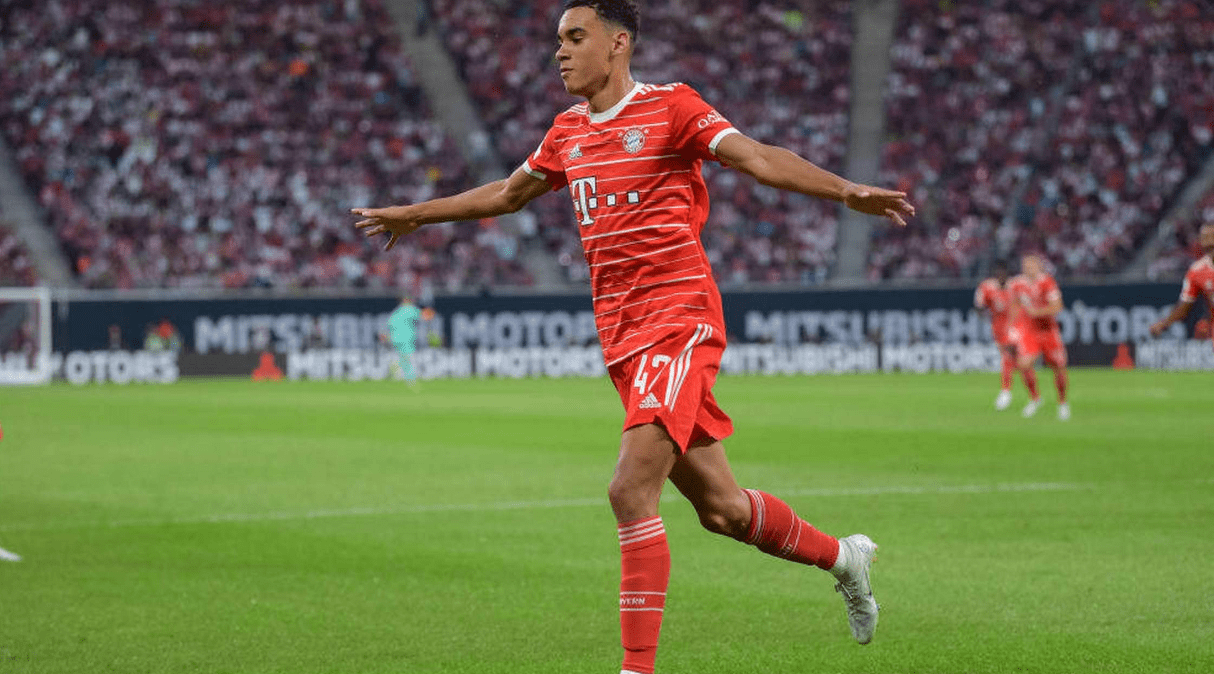Certainly! Here is the translation of the article content into English:
Nowadays, while Musiala is fighting for Bayern and weaving dreams for the future of the German national team, several challenges at the contract negotiation table have put this football superstar in an unprecedented dilemma. An annual salary exceeding 24 million euros sounds like an astronomical figure, but in the exchanges between Bayern and Musiala's team, the issue is not about money, but rather in the "details": the termination clause.

Musiala's team insists on adding a termination fee of 175 million euros to the new contract, which Bayern firmly rejects. On one side is the young talent's demand for autonomy in the future, and on the other is Bayern's unwillingness to budge from tradition. This negotiation seems to be only about a piece of paper, yet it reflects the deep-seated changes in the relationship between clubs and players.
Among the new generation of stars, Musiala has long shed the impression of being a "child." He has a dream of winning the Ballon d'Or, which is normal; which 21-year-old genius doesn't want to stand on the top podium of world football? But the question arises: are Bayern's current conditions sufficient to support him in achieving this goal?

If you are not familiar with Musiala, his story can be described as "talent defines everything." Remember in 2020 when a teenager just turned 17 made his first appearance in Bayern's starting lineup? The way he played was like a masterpiece painted by someone. He wasn't in a hurry to prove himself, but every step made people go "wow."
In the 2021 European Cup and the 2022 World Cup in Qatar, this young man in his early twenties quickly became the core figure of the German national team's revival. He is the catalyst in attack, the "secret weapon" in the coach's heart, and the "savior of Germany" in the eyes of fans. German media has openly called him the "cornerstone of the post-Kroos era," which is not only a compliment but also an expectation.

However, dazzling potential alone is not enough to guarantee the future. Musiala is more aware than anyone that to stand out in the competition for the Ballon d'Or, besides personal effort, one also needs the support of a truly competitive club. Obviously, Bayern's performance in the Champions League in recent years is not entirely reassuring. It can be said that this is also one of the important reasons why Musiala is willing to propose a termination clause: to leave a "way out" in case of need.
Bayern is a club that commands respect for its firmness, especially in contracts. You may find it hard to believe that this top club has never included a termination fee in any player's contract. This tradition helps the team maintain absolute control over key players and prevents wealthy clubs like those in La Liga and the Premier League from easily poaching core players.

But the question arises: is Bayern's extreme contract tradition still applicable to today's market? As a club, of course, they hope that players will serve as long as possible and avoid situations where they are forcibly bought out due to termination fees. But what about young players like Musiala who yearn for controllability? Without such clauses, how can they feel more secure? Perhaps for Bayern, the termination fee is not a question of fairness or right and wrong, but rather a major test of whether or not to compromise.
But Bayern's confidence is not without basis; much of their confidence at the negotiating table comes from their solid financial situation. As one of the very few top clubs in the football world with no debt, Bayern is always known for its stability. The latest financial report shows that this old-fashioned giant's annual revenue has exceeded 1 billion euros, a figure that is highly competitive globally.

In the past, Bayern was often jokingly referred to as a "frugal winner," unlike Premier League clubs that frequently break transfer fee records. However, it must be acknowledged that their stable financial strategy has allowed the team to remain firmly rooted in top-level league competitions. However, the problem is obvious: facing the encirclement of the Premier League and Saudi Arabian money-driven football, international opponents who spend money like water will chase after the loopholes in your star players' contracts. How long can Bayern hold out?
An interesting comparison is with another Bundesliga super rookie, Wirtz. His team, Bayer Leverkusen, has a salary level far below Bayern, but he has gradually become a target coveted by many top clubs. If Bayern's contract negotiations do not proceed smoothly, other clubs will surely not miss the opportunity with Musiala.

It's not just contract negotiations; Musiala now bears pressures far beyond these. As fellow newcomers in the Bundesliga, the media phenomenon surrounding Musiala and Wirtz reveals some subtleties. For Bayern, they cannot do without super rookies to supply the team's offensive and defensive system, while for Musiala himself, the realization of his talent on the peak stage is the eternal pursuit of self-identity.
Standing at the crossroads where talent shapes the future, Bayern seems to have to start asking: Can the resources and goals we provide now really allow Musiala to become a "non-saleable item" for Bayern in the next five to ten years with peace of mind?

More and more young players are beginning to list the Ballon d'Or and individual honors as the ultimate goals of their careers. And the foundation for achieving all this is the club's sustained competitiveness on top platforms like the Champions League.
In the past five years, Bayern's performance in the Champions League has actually been unstable. Although they successfully won the trophy in 2020, they have repeatedly stumbled in the knockout stages in subsequent seasons, sometimes even appearing powerless. This clearly raises doubts in the minds of players like Musiala: staying here, can the glory I desire really be within reach?

Indeed, this negotiation between Musiala and Bayern is not just about 24 million euros and a 175 million euro termination fee. It is a collision between club tradition and the demands of new-era players, and it is also a reflection of how Bayern adjusts its strategies and meets challenges in the context of competition among top clubs. At the crossroads of fate, someone always has to take the first step, and then it remains to be seen who takes the steadier steps.
(Disclaimer) The processes and images described in the article all come from the Internet. This article aims to promote positive social energy and does not contain vulgar or inappropriate content. If there are any copyright or personal infringement issues, please contact us in time, and we will delete the content immediately! If there are any questionable parts of the event, we will delete or make changes immediately after contacting us!